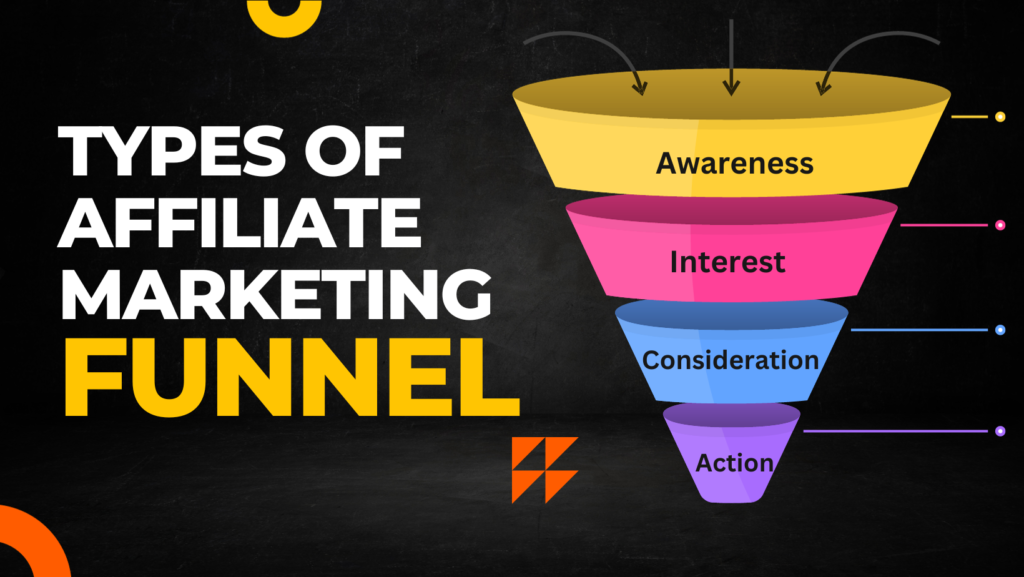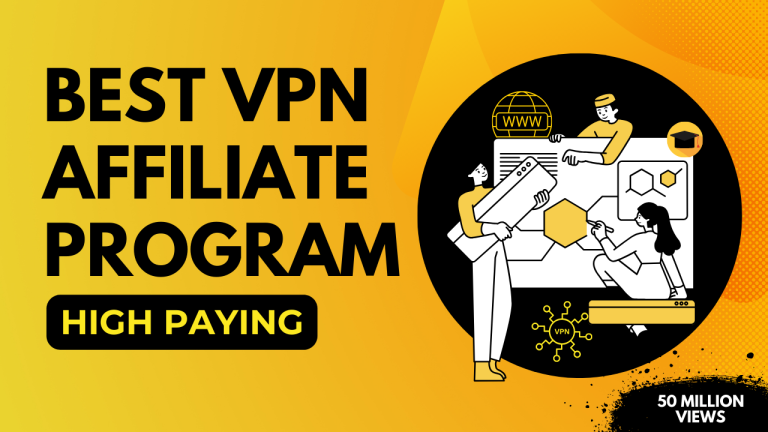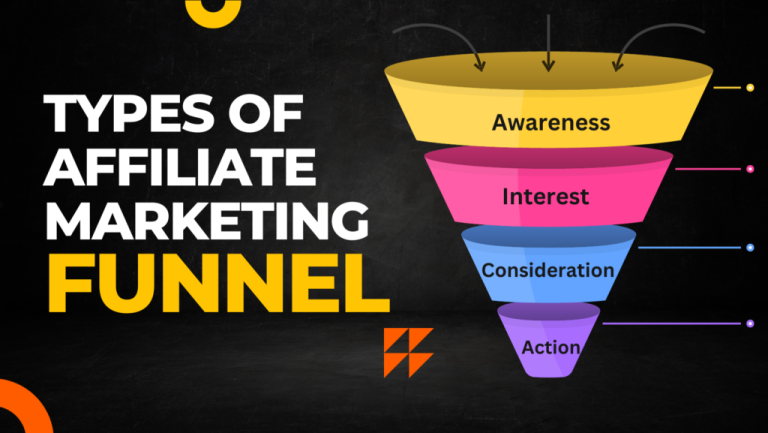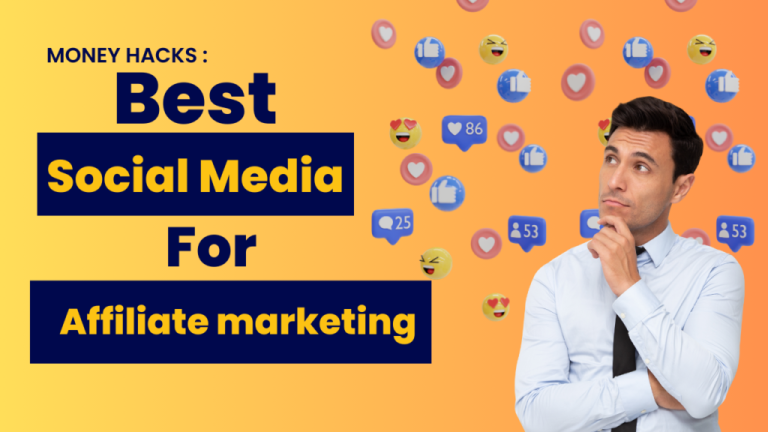Are you interested in affiliate marketing and looking for the best affiliate marketing funnel to increase your conversion?
If you answered YES, make sure you read this article.
It might sound easy, but the question arises how to bring traffic and convince consumers to buy your affiliated product?
In this blog post, You will learn the types of the affiliate marketing funnel you can use in your affiliate marketing journey.
Let’s go!
What is an affiliate marketing funnel?
Now, let’s take a look at what an affiliate marketing funnel is.
Think of it as a filtering process that helps to find and target audiences who are interested in our affiliate products.
An affiliate marketing funnel is the journey from website visitor to affiliate conversion. Building a funnel is an art in itself. it is built on research and the niche of the product.
An affiliate marketing funnel is divided into four stages a customer goes through when making a purchase decision.

Here are the steps involved in affiliate marketing
- Awareness: This is the top of the affiliate marketing funnel. At this stage, you need to create awareness about the product or service you’re promoting as an affiliate. This can be done through various means such as content marketing, social media, email marketing, or paid advertising. Your goal is to attract the attention of your target audience and make them aware of the product or service.
- Interest: Once potential customers are aware of the product, the next step is to generate their interest. This can be achieved by providing valuable content, such as in-depth product reviews, how-to guides, or informative blog posts. Your content should address the needs and pain points of your audience and highlight how the product you’re promoting can solve their problems.
- Consideration: In this stage, potential customers are actively considering the product or service. You can help them by offering comparisons with similar products, showcasing the benefits and features, and addressing common objections or concerns. You might also provide incentives like discounts or bonuses to encourage them to move further down the funnel.
- Conversion/Action: The ultimate goal of the affiliate marketing funnel is to lead potential customers to take action and make a purchase through your affiliate link. This could be a sale, a subscription, or any other desired action that earns you a commission. Ensure that the process is smooth and that you’re transparent about your affiliate relationship.
An effective affiliate marketing funnel:
- Maximizes Leads: It aims to capture as many potential leads as possible.
- Gains Access to Conversion Data: This data can be invaluable for future optimization.
- Solves Customer Problems: It addresses the pain points of your audience.
- Establishes You as an Expert: Positioning you as a specialist in your niche.
👉 Finding Your Affiliate Marketing Niche: A Step-by-Step Guide 2023
Types of Affiliate Marketing Funnels
There are different types of marketing funnels. The one you choose for a particular affiliate program will depend on several factors, including your audience, your audience, your goal, your product or service, etc.
Here are some of the most used funnels by affiliate marketers:
1. Lead Magnet Funnel
The primary aim of this funnel is straightforward – to acquire leads. This objective can encompass activities like expanding your email subscriber list and cultivating an audience for a new product or event. Dive into this article to gain insights on creating a funnel from the ground up.
Lead generation can be pursued through a variety of avenues, which can be categorized into two main groups: organic and paid.
Organic channels encompass cost-free methods for obtaining leads, such as website traffic, word-of-mouth referrals, and leveraging social media. We’ll delve deeper into these organic strategies as we explore various funnel types in more detail later in this list.
Paid channels, on the other hand, involve any investments made to attract attention to your offerings. In practical terms, this primarily entails advertising efforts.
Lead Magnet Example :
You could create an e-book titled “Email Marketing Best Practices.” This e-book contains valuable insights, tips, and strategies for effective email marketing. It’s something that your target audience, which might include small business owners or marketers, would find highly beneficial.
Here’s how the Lead Magnet Funnel works:
- Offer the Lead Magnet: You promote your e-book through various channels, such as your affiliate marketing blog or email campaigns.
- Capture Contact Information: Interested visitors are prompted to provide their email addresses in exchange for access to the e-book. This is often done through an opt-in form on your website.
- Deliver the Lead Magnet: Once a visitor submits their email, they receive a link to download the e-book.
- Build a Relationship: After capturing their email addresses, you can continue to engage with your leads through email marketing. This is where you can further promote the affiliate product you’re associated with.

Use Cases for Lead Magnet Funnel:
- E-books and Guides: E-books, guides, or whitepapers can be powerful lead magnets across various niches. For example, if you’re an affiliate for a health and wellness product, you could offer an e-book on “Healthy Eating for Weight Loss.”
- Templates and Tools: Provide downloadable templates or tools that address a specific problem. If you’re an affiliate marketer for a finance app, you might offer a budgeting spreadsheet as a lead magnet.
- Email Courses: Create a series of email courses that deliver valuable content over several days or weeks. For instance, if you’re an affiliate for a language learning app, offer a 7-day email course on basic phrases in a foreign language.
- Checklists and Cheat Sheets: Simple, actionable resources like checklists or cheat sheets can be effective lead magnets. If you’re an affiliate for a productivity app, a “Time Management Cheat Sheet” could be valuable to your audience.
2. Webinar Funnel
The Webinar Funnel is a strategic approach in digital marketing aimed at hosting and promoting educational webinars to engage, inform, and convert participants into customers or clients.
Webinar funnels are a HIGHLY EFFECTIVE method for building brand authority, nurturing leads, and ultimately guiding them toward taking action, such as purchasing a product or service.
Webinar funnels are typically used for sharing in-depth knowledge, conducting live or pre-recorded presentations, and facilitating interaction with the audience.
Use Cases for Webinar Funnel:
- Software Demonstrations: If you’re promoting software products, host webinars that provide in-depth demonstrations of the software’s capabilities, helping users understand how to use it effectively.
- Educational Webinars: Offer educational webinars related to your affiliate niche. For example, if you’re an affiliate marketer for a digital marketing tool, host webinars on effective digital marketing strategies.
- Industry Insights: Host webinars that offer insights into your industry. For instance, if you’re promoting a finance app, you can organize webinars discussing financial planning or investment strategies.
- Product Launch Webinars: Promote product launches or updates through webinars. Showcase the new features and benefits to your audience.
- Expert Interviews: Host webinars where you interview industry experts or thought leaders. This can be an excellent way to bring valuable insights to your audience.
3. Review Funnel
The Review and Comparison Funnel is a strategic approach in affiliate marketing and content marketing aimed at providing valuable insights to potential buyers by comparing and reviewing products or services.
Review and comparison funnels are EXCEPTIONAL for helping consumers make informed purchase decisions by presenting them with detailed evaluations of different options.
RCF funnels are typically used to promote affiliate products or services by showcasing their features, benefits, and drawbacks in a comprehensive manner.
There are 3 main elements in building a Review and Comparison Funnel and making it effective.
- The Review and Comparison Funnel Elements: Introduction, Detailed Reviews, Comparative Analysis, & Call to Action
- Keyword Research
- Engaging Content Strategy
Infographic: Review and Comparison Funnel Diagram Consider creating an infographic to visually represent the Review and Comparison Funnel. This infographic can be embedded within your content, simplifying the decision-making process for your audience.
Additional Content Ideas:
- Best Camera Roundup: Create posts that showcase the “best” camera models in specific categories, such as “Best DSLRs for Beginners” or “Top Mirrorless Cameras for Travel Photography.”
- Video Reviews: Enhance your content by including video reviews where you demonstrate the cameras’ features and performance. Many users find video content engaging and informative.
- User Reviews and Testimonials: Incorporate user reviews and testimonials to provide social proof and build trust with your audience.
- Regular Updates: As new camera models are released, update your content to ensure it remains relevant and up-to-date. This shows your commitment to offering the latest information.
4. Email Marketing Funnel
The Email Marketing Funnel is a strategic approach in digital marketing aimed at nurturing leads and converting them into loyal customers through email communication.
Email marketing funnels are a POWERFUL method to engage with your audience, deliver valuable content, and guide them toward making a purchase or taking desired actions.
EMF funnels are typically used for building relationships with your subscribers and encouraging them to take specific actions based on their interests and engagement levels.
There are 4 main components to building an Email Marketing Funnel and making it a well-oiled machine.
The Email Marketing Funnel Components: Lead Magnet, Email Sequences, Conversion Emails, and thank You Emails
Infographic: Email Marketing Funnel Diagram Consider creating an infographic to visually represent the Email Marketing Funnel to your audience. This can make the process more engaging and understandable.
Use Cases for Email Marketing Funnel:
- Product Promotion Series: Promote affiliate products or services by creating a series of emails that educate subscribers about their value and features.
- Course or Membership Promotion: If you’re an affiliate for online courses or membership programs, use email series to showcase the content and benefits to potential customers.
- Event or Webinar Promotion: Build anticipation for webinars, workshops, or events by nurturing subscribers with emails that provide details, insights, and incentives for attending.
- Newsletters: Regularly send newsletters that offer valuable content and updates, including promotions and special offers for affiliate products.
- Seasonal Campaigns: Plan email marketing funnels around holidays or special occasions to promote affiliate products or services tailored to those events.
5. Product Launch Funnel
The Product Launch Funnel is a strategic approach in affiliate marketing aimed at promoting the launch of a new product.
Product Launch funnels are an AMAZING way to provide your customers with tons of value before presenting them with a paid offer.
PLF funnels are typically used for your mid to high-ticket offers and allow you to make your customers comfortable with purchasing at higher price points from you.
There are 3 main pieces to building a Product Launch Funnel and having it all automated.
- The Product Launch Funnel Steps: Opt-in Page, Video Pages, Order Page, & Thank You Page
- The Email Lists
- The Follow-Up Funnel Sequence
Infographic: Product Launch Funnel Diagram Consider creating an infographic to visually represent the Product Launch Funnel to your audience. This can make the process more engaging and easy to follow.
Use Cases for Product Launch Funnel:
- Video Games: Promote the launch of new video games by gradually revealing aspects of the game, building anticipation, and offering exclusive pre-order bonuses.
- Technology Products: Create excitement around the launch of tech gadgets by showcasing their features and benefits, and offering early-bird discounts to your audience.
- Fashion and Apparel: Promote new clothing lines by revealing exclusive previews, designer insights, and early access to your fashion-forward audience.
- Books and E-books: Generate buzz for book releases by sharing snippets, author interviews, and pre-order incentives such as signed copies or limited edition cover designs.
- Events and Webinars: If you’re an affiliate for events or webinars, use a similar funnel approach to create anticipation and encourage early registrations.
Final Thoughts
Affiliate marketing funnels are versatile and powerful tools for promoting products and services while earning commissions. Each type of funnel serves a unique purpose, catering to different affiliate marketing strategies. From pre-sell funnels that build trust and rapport with your audience to email marketing funnels that nurture leads, there’s a funnel for every affiliate marketer’s needs.
Throughout this article, we’ve explored various types of affiliate marketing funnels and provided creative examples and infographics to illustrate their potential. It’s important to remember that the success of your affiliate marketing efforts depends on understanding your target audience, delivering valuable content, and continuously optimizing your funnels for better results.




